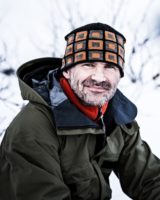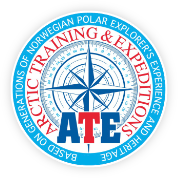Day 1
Most of us will go via Iceland and will meet up in Reykjavik for a leisure evening together. We arrive at the Keflavik International Airport. Stay together in a guesthouse and enjoy a relaxed dinner out on town.
Day 2
Early the next morning we depart from the downtown airfield and 2 hours later we land among the spectacular mountain on the east coast at Kulusuk Island. From here a short helicopter ride takes us in to Tasiilaq, a very picturesque town and the ‘capital’ of the east coast and which is the final meeting point for all the team. We check in and go straight to the store for shopping. The rest of the day is packing and preparing, – but we will not drop our last served meal in a restaurant…
Day 3
The first half of the day is all about finishing preparations and change into the expedition clothing that will stay on for the next 3 weeks plus. Then we put the clean “civilian” clothes in the mail to be sent to the other side and take lunch.
In the afternoon we board a small boat and leave for the Isortoq area. This is a spectacular and wonderful experience as we pass lots of icebergs. Depending on the ice, we arrive in the fjord inside Isortoq (a tiny, but very authentic hunting and fishing village) in early evening. From here we carry everything a short distance up to a cabin where we plan to stay the night. We say plan, as both storms and local festivities may have rendered it uninhabitable.
Day 4
Early the next morning we set off. We walk on foot on hard and icy surface. The first part is easy, but later in the day the ice roughen as we start gaining altitude. How far we get is impossible to plan. Sometimes the winter has dumped lots of snow and combined with a cold summer the crevasses can be mostly filled up. If the contrary is the case, and maybe with extreme melting during summer, we may be facing huge crevasses, melt rivers and even crevasses filled with water! It is never the less a wonderful game of chess against a cunning opponent called “Mother Earth” !
What is for sure is that we will be up against some pretty wild, bumpy and challenging ice that will test out stamina and mind-set.
Day 5-6
Second and / or third day on the ice we negotiate the field with the biggest crevasses. Here we will have to zigzag a lot and find the safest way. But on the other side we can normally have good use of the skis and start to make distances.
Day 7-12
Even out of the lower icefall, we have to work hard. On the big rolling hills we rapidly gain altitude, but normally the ski-conditions are good. Gradually we are out of the coastal zone and the chance of rain is diminishing as the polar climate takes over.
We hardly recognize that the last mountains disappear under the horizon as we now are focused on the west and the plains.
We are heading into the katabatic wind http://en.wikipedia.org/wiki/Katabatic_wind and get little rest till the landscape gradually eases out. After some 10 days the wind fluctuates, the weather hesitates as we get closer to the highest point. This is called ‘Summit’ and is a long and rounded ridge going in south-north direction up Greenland. In the fall, the low pressures hitting Greenland from Canada in the west, and the low pressures building up between Iceland and Greenland fight for supremacy and can play games with us…
Normally we put in a rest day in this area, but instead of planning it we let the weather decide what day is best.
Day 13-16
As we clear the highest area the winds stabilizes (normally) and start coming in from behind. At the same time we move into the flattest par of the journey. These plains here are beautiful and we do great distances. If the weather is good, DYE II will show at the horizon when we are several days away! It comes and goes a bit, but this makes navigation very much easier. As we get there we camp and may enjoy half a rest day. Apart from having a look at the monstrous relic from the cold war, we go over the equipment, sleep, eat and drink.
Day 17-22
Soon after leaving DYE II we come across the first lakes filled with melt water from the summer. They are frozen up, but give an indication that more is to come. Over the next days the ice roughen again as we start loosing altitude. We do great distances, but from year to year there can be huge differences in the amount of havoc the melting has done to the ice. If the summer has been cold and the frost has arrived early with snow we may get to 50km from land with no obstacles. If the contrary is the case the fight begins here and the ice looks like a stormy ocean frozen up in a millisecond. It is hard work but at he same time just so incredibly fascinating!
Day 23-27
Exactly how many days we will use, are as you may understand, impossible to predict. But that is the greatness of the autumn crossing. If your mind can take this and not getting downcast by one surprise after another, then you know you are bred for bigger things!
As we dip into the icefall the smaller rivers grow in sizes and we have to negotiate riverbeds 10-20 metres wide and with 10 metre steep sides (hopefully with only some water still left as the mega melting from the plateau has stopped). But now we have sighted land for the first time, and spurred on we stretch the days and muster everything as we slowly make our way towards it. Sometimes it may take hours to complete just a kilometre, but the satisfaction of fighting our way gradually closer is immense! And as we step off the ice in unison we feel the biggest accomplishment!
Later that day we are picked up by a car and driven to Kangerlussuaq. It is time for a beer, a loooong warm shower and a good meal !
Day 28
The flight back to Copenhagen, does not leave every day. And since we do not know if we will use 24 or 28 days we recommend tickets that you can change.
Then we head for Home via Copenhagen (all letting the adventure sink in and – pondering where to go next?).


